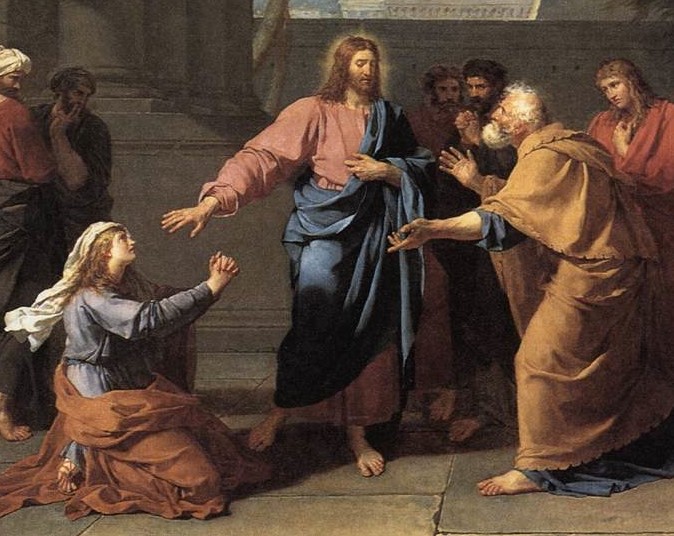August 16, 2020
Twentieth Sunday in Ordinary Time, Year A
Isaiah 56: 1, 6-7
Romans 11: 13-15, 29 -32
Matthew 15: 21-28
“For my house shall be a house of prayer for the nations.” This prophecy of Isaiah sets the stage for both the Gospel and the second reading. Each time you are reading the Gospel according to St Matthew, always remember it was written for a Jewish community struggling to preserve its connection with Judaism and the tradition of the Fathers and very reluctant to accept change. And so, in the Gospel according to Matthew Jesus began his public ministry by declaring that he was sent to the lost sheep of Israel (Matt 10, 6). But Matthew anticipates this turning point when gentiles will be welcomed in the Church. How did he do that?
The great heroes of faith in the Matthew’s Gospel account are Gentiles. In Matt 2, 1-12 we see the three men who read the stars and came seeking the messiah. They were pagans. In Matt 8, from 5 we read about the Roman centurion of Capernaum. As Jesus entered Capernaum, he came to beg Jesus to heal his servant. At once, Jesus said, ‘I will come and heal him.’ The centurion said no, you don’t need to come, only say the word. Verse 10 says Jesus was astonished and he said to those around him, “Nowhere in Israel have I seen such great faith.” Still in chapter 8, verse 28, Jesus reached Gadara a pagan town. He saw two men possessed by devils, coming out of the tomb, they shouted to Jesus, “what have you come to do with us, You Son of God?” – You can see that there is something positive even among pagans possessed by demons – the list can go on and on.
In the Gospel today, Jesus is in a gentile territory, the region of Tyre and Sidon in Southern Lebanon and North of Jerusalem. Geography is important here. He goes out to the peripheries. This foreign woman who will not take no for an answer walked up to Jesus, paid him homage and made a daring and bold request. “Lord, Son of David, have pity on me, my daughter is terribly troubled by a demon.”
For the Jews, it is bad enough to be a gentile and worse to be a Canaanite. Why is that? In Genesis 10:15 we find that Sidon is the first son of Canaan who is the great ancestor of the enemies of Israel – the Hittites, the Jebusites, the Amorites etc. So, the Canaanites are chief among the enemies of Israel whom Israel conquered during the time of Joshua and the Judges and occupied their land. This woman is not just a gentile and a pagan, she is a Canaanite which of all the pagan people was the most immersed not just in idolatry but also in immorality. They worshipped Molloch, a demon associated with child sacrifice. Deuteronomy 12: 31 makes it clear that child sacrifice was a regular feature in the religion of the Canaanites. Again, the Canaanites were in constant war with Israel. If you want to understand the Canaanites symbolized wickedness, read the Book of Wisdom chapter 12 and pay attention to verses 4 and 5. Even God hated them because of their detestable practices of sorcery, demon worship, pitiless slaughter of children and eating of human flesh. So, for the Jews, a Canaanite is evil personified.

Yet this Canaanite comes up to Jesus to ask for mercy. And she calls Him “Lord, son of David.” Her address to Jesus tells us she is not an ordinary Canaanite. She addressed Jesus by His messianic title- ‘son of David,’ honoring Him as king and messiah which is a lot more than what Jesus got from His own Jewish people. While many of the Jews rejected Him, this Canaanite woman recognizes Him.
How does Jesus respond to this extraordinary plea and the honor that this woman gives Him? He ignores her and doesn’t answer her a word. This is very mysterious and frankly, somewhat rude. If someone comes to you to beg for something and hails you, would you not say anything? What is interesting is that Jesus does not send her away. When the disciples saw her, they approached Jesus and said to Him, “send her away, see how she is shouting after us.” It is at this point that Jesus responded, “I was sent only to the lost sheep of the house of Israel.” But kneeling down, she begged Jesus for help. The Greek word translated as kneeling is proskuneo which actually means kneeling down or prostrating while kissing the hand of a superior. It is also used to translate worship. Clearly, this woman venerates Jesus as Lord.
Jesus still resists and says, “it is not fair to take the children’s food and throw it to the dogs.” Normally, this will constitute an insult. Among the Jews, calling someone a dog is a common way of referring to people who are sinners, who are unclean. Revelation 22: 15 says outside the heavenly Jerusalem are the dogs. So, Jesus is giving a kind of a parable where the children represents the Israelites and the dogs represent the gentiles; and this woman understands it. And so, she persists; “yes Lord, even the dogs eat the scabs that fall from the table of the master. That’s the breaking point. To this Jesus answers, “O woman, great is your faith! Let your wish be granted.”
So, what is the lesson for all of us? The Canaanite woman who is a symbol of evil teaches us that our sins notwithstanding, if we turn to Jesus, He will not send us away, He is ready to welcome us. This woman who is stubbornly bent to receive her blessings, not only teaches us the importance of prayer, she also teaches us that prayer has to be humble, with faith and perseverance. She teaches us never to give up. She teaches us that God’s love has no boundaries. The readings today remind the Church and indeed all of us of our mission ad extra. They remind us that everyone is welcome in the house of God. One of the obstacles to Christian evangelism is prejudice. We consider some people too evil and irredeemable that we think it will be a waste of time and resources to bring them the Gospel of Jesus Christ. If we open ourselves up to God and allow his work in us, we will see ourselves break out of the circles and strongholds that have prevented us from going to the geographical and existential peripheries to bring souls to God.
Happy Sunday!

Fr Chidi Onwuka M.Ss.Cc

Thanks greatly fr for this wonderful and soul-enriching word of God today. May you be richly blessed.
Father , you have broken today’s readings to the lowest level and I personally appreciate so . It also teaches me to preserve , hope and have faith in God as He alone has the living water.
Wow! Well detailed! Inspiring! I loved the lesson for us all. Wonderful as usual👏🏾👏🏾👏🏾👏🏾👏🏾 Happy Sunday Father. Thank you for this 🙏🙏🙏